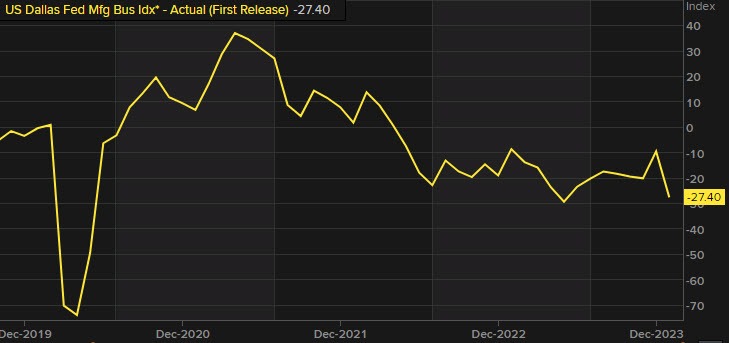Dallas Fed Manufacturing Index Plummets in January
The latest data released by the Dallas Federal Reserve Bank has revealed a significant decline in the manufacturing sector for the region. The general business activity index fell to -27.4 in January from -10.4 in December 2024, marking a sharp decrease. Additionally, the output index plummeted to -15.4 from +1.2 in the previous month, indicating a contraction in production levels.
Key Components of the Report
1. Production: Production levels fell to -15.4 from +1.2 in December, highlighting a notable decrease in manufacturing output.
2. New Orders: New orders also took a hit, sliding to -12.5 from -10.1 in the prior month, indicating weaker demand for manufactured goods.
3. Shipments: Shipments experienced a significant drop, falling to -16.6 from -5.3 in December, reflecting a slowdown in the distribution of goods.
4. Employment: The employment component of the index declined to -9.7 from -2.8 in the previous month, signaling a decrease in hiring activity within the manufacturing sector.
5. Hours Worked: Hours worked by manufacturing employees decreased to -11.8 from -0.2 in December, highlighting a reduction in labor utilization.
6. Wages and Benefits: Wages and benefits also saw a decline, dropping to +20.8 from +25.1 in the prior month, indicating potential cost-saving measures taken by manufacturers.
7. Prices Paid for Raw Materials: The report did not provide specific data on this component, but it is likely that manufacturers are facing upward pressure on input costs due to supply chain disruptions and inflationary pressures.
Overall, the Dallas Fed manufacturing index paints a challenging picture for the manufacturing sector in the region, with various key components pointing towards a weaker outlook for the industry.
How Will This Impact Me?
As a resident or worker in the Dallas area, the sharp decline in the manufacturing sector could have several implications for you. If you are employed in the manufacturing industry, there may be increased uncertainty regarding job stability and potential layoffs as companies adjust to the challenging business environment. Additionally, reduced production levels and weaker demand could lead to a slowdown in overall economic activity, impacting consumer spending and potentially affecting job opportunities in other sectors as well.
How Will This Impact the World?
The decline in the Dallas Fed manufacturing index is part of a broader trend of slowing economic growth and increased uncertainty in the global economy. As a key manufacturing hub in the United States, the performance of the Dallas manufacturing sector can have ripple effects on supply chains, trade relations, and overall economic sentiment both domestically and internationally. The weakening of manufacturing activity in Dallas may contribute to broader concerns about inflation, supply chain disruptions, and global economic stability, impacting businesses, consumers, and policymakers around the world.
Conclusion
In conclusion, the latest data from the Dallas Fed manufacturing index indicates a challenging environment for the manufacturing sector in the region. With key components such as production, new orders, and employment showing negative trends, it is clear that manufacturers are facing headwinds that could have spillover effects on the local economy and beyond. Monitoring future developments in the sector will be crucial to understanding the broader economic landscape and potential implications for individuals, businesses, and policymakers.





